Environmental Stewardship

This spring, I gave up alcohol for Lent, the forty days of penitence between Ash Wednesday and Easter. And now almost one week after the Alleluias and Easter baskets, I may be addicted to Lent.
On Shrove Tuesday, the day before Lent began, my thirteen-year daughter Maya explained alcohol to her seven-year old sister in the backseat of our car: “See, sometimes adults just like having a drink after a long day of work. It helps them relax.” That same week, one of my friends said, “You aren’t a heavy drinker, but you are a consistent drinker.”
It was time to take a break, even if I knew that one glass of red wine at night wasn’t the end of the world. I needed to give it up because I wasn’t sure if I could.
FOR MANY IN the global South, climate change is not an abstract theory. Victor Mughogho, executive director of the Eagles Relief and Development Programme in the southeast African country of Malawi, has experienced firsthand the toll of global warming and extreme weather. He works with local churches to develop practical and faithful solutions to mitigate the effects of climate change. Sojourners assistant editor Elaina Ramsey interviewed Mughogho early last year when he visited Washington, D.C.
Elaina Ramsey: How has climate change affected the people of Malawi?
Victor Mughogho: The impacts are quite severe on the ground. Rural people in Malawi constitute about 85 percent of the population. These people are subsistence farmers. For them, rainfall is everything. Without the rain, there's no agriculture, no livelihood.
The weather patterns have changed and are so unpredictable now. In the past 20 years, official records from the government show that we've had five severe droughts. Because of the cycles of drought, there is less and less water in the ground. The water table is sinking. Trees and grass are stunting and rivers are drying up.
If you asked a person "What will happen in the next 10 or 20 years?" they'd say that what's bad now, in retrospect, is going to look like a good time. It looks like worse times are coming ahead.
Books
Faith meets science
- Scientist Katharine Hayhoe and her spouse, evangelical pastor and writer Andrew Farley, gently and wisely respond to the concerns of those who deny the reality of climate change in A Climate for Change: Global Warming Facts for Faith-Based Decisions (FaithWords). An accessible exploration of the science behind climate change and the faith-based reasons why Christians can and must act.
- Ben Lowe, of Young Evangelicals for Climate Action, describes the rise of climate leadership on Christian college campuses in Green Revolution: Coming Together to Care for Creation (IVP Books).
- In Global Warming and the Risen LORD: Christian Discipleship and Climate Change (Evangelical Environmental Network), Jim Ball offers biblical and spiritual resources needed to meet the challenge.
- No Oil in the Lamp: Fuel, Faith and the Energy Crisis (DLT Books), by Andy Mellen and Neil Hollow, is part science manual, part Bible study and points toward a Christian theology for resource depletion and "peak oil." The unexpected foreword by the CEO of a top U.K. energy company adds depth.
- God, Creation, and Climate Change: A Catholic Response to the Environmental Crisis (Orbis Books), edited by Richard W. Miller, collects original essays by leading Catholic theologians and ethicists to give theological and biblical perspectives on our environmental crisis.
- Green Discipleship: Catholic Theological Ethics and the Environment (Anselm Academic), edited by Tobias Winright, is a compendium drawing on scholars from the fields of ecology, biology, history, and sociology, and includes study group aids. It also has the text of "If You Want to Cultivate Peace, Protect Creation," a January 2010 speech by Pope Benedict XVI, which can also be found at www.vatican.va.
- Sacred Acts: How Churches are Working to Protect Earth's Climate (New Society), by Mallory McDuff, looks at local churches' best practices to reverse climate change.
Thermal mass: More than 30 tons of plaster and other mass on the inside of the house collects and stores heat from sunlight.
Forest-certified lumber: Along with local posts and beams, we used wood certified as sustainably harvested.
Recycled vinyl shingles: Located on the one "traditional" roof that holds our solar panels, these shingles are made from 80 percent post-consumer recycled material and will last more than 50 years.
Straw-bale walls: These fire-resistant, agricultural waste products (not hay) provide 18 inches of cheap insulation, keeping the house warm in winter and cool in summer.
Reclaimed doors, windows, and kitchen cabinetry: Most of the doors and windows are reclaimed from predemolition sites.
"SINCE I KNOW you guys are urban/city folks like me, I was pleasantly surprised to find that you didn't build some ugly house in the woods." Reading through thank-you letters from seventh graders who had come from Washington, D.C., to work with us, we smiled at this line written by a student we had known since kindergarten.
Having lived in the Washington, D.C. area for more than 30 years, it's true we were "urban folks," but our hearts were drawn to the woods. This crazy venture of ours began more than six years ago, when the Rolling Ridge Study Retreat Community, located south of Harpers Ferry, W.Va., was poised to build Woodhaven, a new staff home, in keeping with their deep respect for the earth and their mission of nurturing people and community. As Rolling Ridge members, we began building this home as a way to teach and learn about a different kind of architecture and to explore whether it is possible to create an energy-efficient, attractive home that will use fewer resources, last longer, and be gentler on the earth.
This project required discerning the time for humility and the time for hubris: the humility to know when it's crucial to call on experience and skill; the hubris to jump in and try things we've never done before. We could not have built this house without the brilliant work of our architect, Sigi, and building contractor, John, as well as skilled carpenters, electricians, and plumbers. Nor could we have done it without the enthusiastic work of numerous volunteers.
NEW YORK CITY has been bombed at least twice in the past decade. First by al Qaeda and second by Hurricane Sandy.
In the wake of the Sept. 11 attacks, the United States launched two ground wars and a worldwide "war on terror." Within two months, Congress federalized the Transportation Security Administration to secure airports. More than 263 government organizations were either created or reorganized. Some 1,931 private companies were put to work on counterterrorism, homeland security, and intelligence. Rightly or wrongly, America moved heaven and earth to stop terrorism in its tracks. It was seen as both an ongoing threat and a moral affront that had to be dealt with.
What about Climate Change?
In February, a New York State Senate task force on Superstorm Sandy compared the hurricane that affected 24 states to the 9/11 terrorist attacks. "[On 9/11] there were more than 3,000 souls lost, but in terms of the geographic destruction, it was isolated to Lower Manhattan," said Sen. Andrew Lanza (R-Staten Island). "[After Sandy] we have miles and miles and miles of destruction. Hundreds of thousands of homes affected, 60 ... New Yorkers killed, 250,000 to 260,000 businesses affected."
Hurricane Sandy killed 253 people in seven countries. It was the second largest Atlantic hurricane ever recorded—and the most expensive. It smashed into the East Coast with barely three days' warning. Like hurricanes Katrina and Rita before it, Sandy was a disaster of biblical proportions.
After 9/11, Americans knew in our gut that something was seriously wrong. Our moral intuition had been sucker punched.
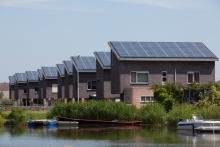
EARLIER THIS YEAR, 14 solar panels were installed on my roof. Each day since—in fact, multiple times a day—I've eagerly checked our online meters, as the sun replaces coal and nuclear plants as the provider of my home's electrical needs.
I've waited a long time for this. I attended my first energy conference in the late 1970s, when I joined several other students from the hunger action group at our Jesuit college, Seattle U., for the 20-hour van ride to Denver—even then, the connection between poverty and energy issues was clear.
That conference was one of several conducted by the U.S. Catholic bishops to gather input for what became a major and still-relevant document published in 1981 under the unassuming name "Reflections on the Energy Crisis." The statement noted that "solar power can help open the way to permanent energy security, pointing beyond the end of fossil fuels."
So last summer I was thrilled to sign a contract with a company called SolarCity, which installed the solar panels on my rooftop under a lease arrangement—they own the panels, and I buy solar power from them whenever the sun shines. And there's sure a lot of sunshine to tap: Every hour of daylight on earth, the sun releases the amount of energy consumed by the entire population of the planet in one year.
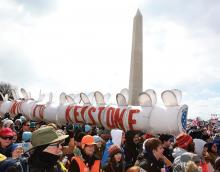
ALL I EVER wanted to see was a movement of people to stop climate change, and now I've seen it. And it looks so beautiful. It's hometown heroes like our friends in D.C. who've been fighting coal plants, and far-flung heroes like those who've been bravely blocking the Keystone XL pipeline with their bodies in Texas. It's people who understand that the fight against fracking and coal ports and taking the tops off mountains is ultimately the fight for a living planet; it's people who have lived through Sandy and survived the drought, some of whom I got to go to jail with recently.
It's the students at 252 colleges who are now fighting the fossil fuel industry head on to force divestment of their school's stock—the biggest student movement in decades. It's all of you—you are the antibodies kicking in, as the planet tries to fight its fever.
We've waited a very long time to get started, I fear. We've already watched the Arctic melt; our colleagues in 191 countries tell us daily of some new drought or flood.
Because we've waited this long, the easiest answers are no longer enough; we're going to have to make tough decisions. Our theme has to be: When you're in a hole, stop digging. Above all stop the Keystone XL pipeline. The president can do it with a single stroke of his pen, and if he does he will become the first world leader to veto a big project because it's bad for the climate. That would be a legacy—and a signal to the rest of the world that we're serious about this fight. It's his test.
IN THE summer of 1969, then-Sen. Gaylord Nelson was on a conservation speaking tour of the West when he visited the beaches of Santa Barbara, at that time despoiled by one of the worst oil spills in U.S. history. The devastation affected him deeply. Later, while reading an article about the teach-ins organized by anti-Vietnam War activists, Nelson asked himself, Why not have a day for a nationwide teach-in on the environment? Thus was born Earth Day 1970.
The original Earth Day was marked by a massive public outpouring of concern for the environment. Earth Day helped spawn new laws such as the Clean Air and Water Acts and the creation of the Environmental Protection Agency, but it did little to staunch the more serious wounds of our dying planet. ... Much of the activity during the 20th-anniversary celebration of Earth Day this April 22 will focus on individual acts. ... But there is a danger in an overemphasis on personal acts, when the most grievous assaults on the natural world come from corporations and nations whose self-interested policies of acquisitiveness and greed have brought us to the edge of ecological cataclysm.

Residents of Mayflower, Ark., spent Easter weekend evacuated from their homes as Exxon Mobil attended to a major oil spill from a crude oil pipeline. Residents described scenes of oil running down the streets like a river, as 22 families were forced to leave their homes.
Since the pipe burst on Friday afternoon, cleanup crews have collected around 12,000 barrels of oil and water. Images from the weekend show quiet cul-de-sacs inundated with thick, black sludge, and parents reported concern for their children and whether they would be able to play outside.

When it comes to the Keystone XL pipeline, the oil and gas industry want you to believe that you have to choose between jobs and prairie grass. This tactic is called the “divide and conquer” or “divide and rule” strategy. It’s as old as the empires of ancient Greece and Rome. It still works because human nature hasn’t changed that much.
Two years ago I sat down across the table from Dr. Kerri-Ann Jones, the highest ranking State Department official (short of the Secretary of State) to weigh in on the Keystone XL pipeline permit process. A group of religious leaders were delivering thousands of petitions to Dr. Jones asking her to to stop the pipeline.
I said to her, "If this decision about the pipeline was made purely based on the climate science, we wouldn't be here having this discussion." She’s a scientist. She knows the score. She didn't disagree. “But,” she said, “everywhere we go across the country we hear about the need for jobs – especially in the middle of the country.”
Divide and conquer.
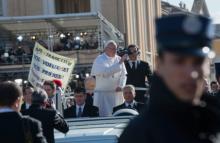
VATICAN CITY — Pope Francis issued a powerful call for the protection of the environment and of society’s most vulnerable during his formal installation Mass at the Vatican, while qualifying his papal power as a “service” to the church and to humanity.
The pope on Tuesday celebrated a solemn Mass in St. Peter’s Square in front of an estimated 200,000 people, as well as political and religious leaders from all over the world.
During the Mass, Francis received the symbols of his papal authority over the world’s 1.2 billion Roman Catholics: the pallium, a lamb’s wool stole that recalls Jesus as the Good Shepherd, and the “ring of the fisherman.”
In keeping with the low-key style that has been the hallmark of his pontificate so far, Francis presided over a somewhat simpler, and definitely shorter, rite than the one that marked the start of Benedict XVI’s reign in 2005.
Francis was slowly driven around a sun-drenched St. Peter’s Square in an open-top car, shunning the bulletproof, air-conditioned popemobile preferred by his predecessors. At one point, he asked to stop the car and got out to bless a disabled person.
In his homily, delivered in Italian, Francis described the church’s mission as “respecting each of God’s creatures and respecting the environment in which we live.”
As Onleilove Alston reveals in “Connecting the Dots,” in the April 2013 issue of Sojourners magazine, Hurricane Sandy vividly demonstrated the relationship between climate change, poverty, and immigration. Healing is taking place as people of faith step up to coordinate recovery efforts and lead advocacy efforts to curb climate change.
To view some of the ways people are making a difference in communities affected by Hurricane Sandy, check out the slideshow below.
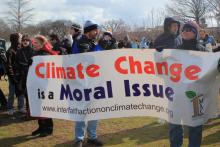
God’s creation is in danger; and to call upon the powers of the world to heal it, God’s people are prepared to go to jail.
Perhaps most famously in our recent history, the startling sight of a religious leader in jail was embodied in the willingness of Dr. Martin Luther King, Jr., to go to jail more than 20 times in order to embody his religious commitment to racial justice, peace, and nonviolence.
As we approach the Holy Week of Christianity and Passover, we should be aware that this tradition goes back thousands of years. The movement of ancient Israelites seeking freedom from a lethal Pharaoh began even before Moses, when two midwives – the Bible carefully records their names, Shifra and Puah – refused to murder the boy-babies of the Israelites as Pharaoh had commanded. The recollection of that moment is the first recorded instance of nonviolent civil disobedience.
When that cruel and arrogant Pharaoh, addicted to his own power, refused freedom to his nation’s slaves, his arrogance forced the Earth itself to arise in what we call the Plagues – ecological disasters like undrinkable water, swarms of frogs and locusts, the climate calamity of unprecedented hailstorms.
Passover has kept alive and lively the memory of that uprising. So it is not surprising that the Gospels record that just before the week of Passover, Jesus led a protest against the behavior of the Roman Empire, its local authorities, and a Temple he and his followers thought had become corrupted from its sacred purpose.
To protest against the Empire of his era, Jesus chose a time that was both appropriate and dangerous, since Passover celebrates the fall of Pharaoh. His challenge resulted in his arrest and imprisonment, and then his torture and execution.
Both Judaism and Christianity can trace their origins to acts of nonviolent civil disobedience. Indeed, for several centuries of Imperial Rome, the very persistence of Rabbinic Judaism and Christianity were collective acts of civil disobedience.
Today, religious folk face modern plagues imposed upon our countries and our planet by a new kind of Pharaoh.
OVER THE PAST few years, we have seen tangible proof that creation is terribly off balance. Global warming is causing droughts and heat waves around the world and is making hurricanes more powerful. In my hometown of New York City, we have experienced the effects of severe weather: Hurricane Irene in 2011 and, most recently, the devastation of Hurricane Sandy. Sandy was an eye-opening demonstration that climate change is a poverty issue, a race issue, and an immigration issue.
Though neighborhoods of all socioeconomic statuses were affected by Sandy, poorer communities are taking longer to recover. Many of them were without electricity, heat, and water longer than were more affluent communities. For instance, residents of Red Hook's public housing projects in Brooklyn were without power and water for two weeks after the storm. My cousin Dabriah Alston, a Red Hook resident, told me that the city ignored residents' repeated requests for information about when the heat would come back on: "The bottom line is, they don't care about us. Projects are filled with poor folk, and as we all know, the poor are seldom a priority."
Hurricane Sandy shone an uncomfortable light on racial and economic disparity in New York City. As someone who was born and raised in Brooklyn, I am very familiar with Red Hook's history of poverty, and the neglect by local government. For example, only when the community near the housing projects began to gentrify did the city start to repair the nearby subway station.
Sandy also exposed how, in the city that is home to Ellis Island, immigrants live in an environment of fear. Although families of mixed immigration status qualify for some FEMA disaster assistance, and families of any status qualify for emergency food aid, many did not apply for it because they feared deportation, as I learned at a post-Sandy meeting of the Occupy Faith group. The environment of fear magnified the impact that the hurricane had already had on the poor: Many immigrants are non-salaried workers who missed a week of their already-low wages due to the hurricane.
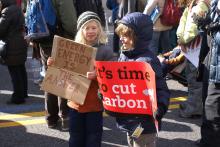
This past Sunday an estimated 35,000 people gathered in Washington, D.C., to push for legislative action in response to climate change. In addition to speaking out against the proposed Keystone XL pipeline, the “Forward on Climate” rally organizers urged President Barack Obama to limit U.S. greenhouse gas emissions and transition to larger levels of renewable energy. In addition to the mass assembly near the White House, environmental groups held similar rallies in cities across the nation, including a significant turnout in Los Angeles. All together, some have described the events of the past weekend as the largest collection of climate change rallies in U.S. history.
The president has recently emerged as a potentially strong ally in the struggle against climate change, for his inaugural address included a renewed commitment to environmental leadership, as he stated: "We will respond to the threat of climate change knowing that the failure to do so would betray our children and future generations.”
President Obama also addressed ecological concerns during his State of the Union speech, as he said: “We can choose to believe that Superstorm Sandy, and the most severe drought in decades, and the worst wildfires some states have ever seen were all just a freak coincidence. Or we can choose to believe in the overwhelming judgment of science – and act before it's too late." While conversation surrounding climate change was notably absent during his recent re-election campaign, the president appears to be making environmental concerns a top priority for his second term of office.
While President Obama seems to be a more visible environmental advocate, many are doubtful of his sincerity and question whether such statements are motivated by political calculation rather than genuine policy priorities. For example, in what can be described as a thought-provoking twist of irony, while thousands marched past the White House to move the president “Forward on Climate,” he was out golfing, which just so happens to be a sport that many environmentalists perceive as an ecological tragedy.
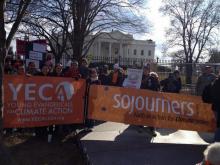
People of faith are in the 'miracle business.'
An estimated 200 people of faith gathered in Washington, D.C., on Sunday morning in preparation for the Forward on Climate Rally on the National Mall. The brief prayer service preceded the larger rally of an estimated 40,000 people urging President Barack Obama to take action against climate change and to reject the Keystone XL pipeline.
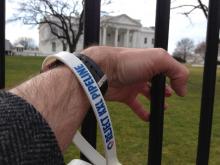
My wrist was cuffed to the White House fence next to the wrist of Robert F. Kennedy, Jr. Our nation’s chief climate scientist James Hanson stood next to me; Daryl Hannah sat in front of us. A few feet away, also cuffed to the fence, Julian Bond stood next to Bill McKibben and Michael Brune, Executive Director of the Sierra Club. Altogether, 48 of us from all over America obeyed our consciences. The days of safety and silence have ended. The time of pretending is over. Humanity will be held accountable for our desecration of creation. It is happening already.
And it was Ash Wednesday. When I mounted the platform to address the rally that preceded our civil disobedience, many were unaware that Lent was beginning. In the context of climate disruption, anyone who cares about creation can embrace the significance of Ash Wednesday. It’s a day of conscience, repentance, and conviction; a day when we take stock of our lives and our life together on the planet; a day when we confess our self-indulgent appetites, our intemperate love of worldly goods and comforts, and our obsession with consumption of every kind. For Christians, Ash Wednesday is a day to acknowledge that we are accountable to the God who gave us life and who entrusted the earth to our care.
Ash Wednesday is a good day to be arrested, I told the crowd. It’s a good day to realign our lives with God's desire to preserve this good creation. I invited any who wanted to receive ashes as a sign of their repentance to approach me on their way to White House.
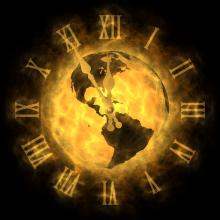
In contrast to the ongoing public and political debate surrounding the legitimacy and urgency of climate change, the global scientific body of knowledge appears to be overwhelmingly clear, as highlighted in The Great Disruption by Paul Gilding:
"The consensus position on climate change is reflected in the rigorously peer-reviewed journals in which research is presented and issues are debated. One study by Naomi Oreskes, published in the journalScience, demonstrated that of the papers whose abstract contained the keywords global climate changebetween 1993 and 2003, none questioned the consensus position – not one. Oreskes’s subsequent book,Merchants of Doubt, revealed how many who once fronted the tobacco industry’s anti-science campaign to deny the link between smoking and lung cancer are also now prominent and vocal climate change skeptics, and they are often funded to create doubt that has no credible scientific basis."
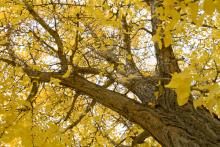
I had a happy childhood, with few moments of true anguish. One that I will always remember, though, is when they cut down the tree on Euclid Street.
Throughout my early years, I would often take walks with my parents down this street, stopping to play on this tree’s bulging roots and hug its large trunk. On this particular weekday, my favorite tree had been replaced with a stump and some sawdust due to the risk of it falling over and taking out all the power lines its branches had engulfed. My four-year-old self was in shock.
I spent the afternoon wailing, to the dismay of my parents and the neighbor who came over for a play date. To this day, when I walk down Euclid Street and see pieces of the branches still hanging on to the power lines, I remember what it felt like to lose my first friend.